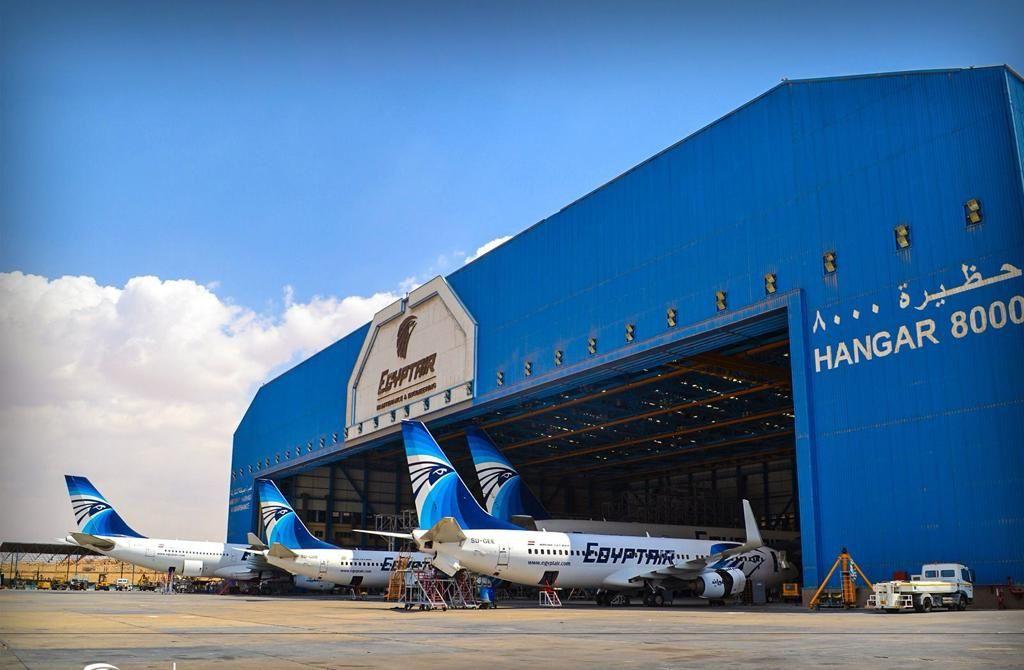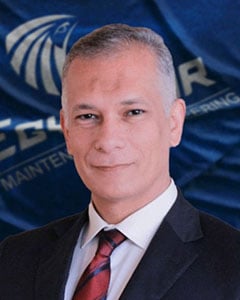
Ibrahim Fathy Zaki was appointed as the new chairman of EgyptAir Maintenance & Engineering in September. In his first exclusive interview with the international media, he spoke with Aviation Week Network about his growth priorities and how the MRO provider is tackling supply chain and new engine challenges.

One of your key priorities as EgyptAir Maintenance & Engineering’s new chairman is employee growth. What does this entail?
EgyptAir Maintenance & Engineering (M&E) is investing in comprehensive training programs that cover both technical and soft skills, regularly assess employees' skills to identify areas for improvement and utilize online resources for flexible learning. Additionally, the company is working to establish mentorship programs to pair experienced employees with junior staff, offer coaching services to help employees develop their skills and create clear career paths with opportunities for advancement.
To maintain a positive and engaging work environment, we are implementing initiatives like team-building activities and employee recognition programs.
Finally, the company is planning to invest in leadership development programs to equip employees with the necessary skills to take on management roles and develop a succession plan to identify and nurture future leaders. We believe, by prioritizing employee development, we can create a highly skilled and motivated workforce that is equipped to meet the challenges of the future and drive the company’s growth.
Another of your priorities is expanding services to support the growing EgyptAir fleet. What will this entail?
The services we are expanding include component repair and overhaul, engine maintenance and repair, structural repair and modification, paint and interior refurbishment, and technical training and certification. By investing in advanced technologies, expanding facilities and developing specialized expertise, we can become a more comprehensive and self-sufficient MRO provider, enhancing our competitiveness in the global aviation market and supporting the growth of EgyptAir’s own fleet.
EgyptAir has signed a contract to add [Airbus] A350s and [Boeing] 737 MAX aircraft, and currently, we already have capabilities up to a line maintenance service. However, we are working on adding base and component maintenance for the newly acquired aircraft types.
How much of EgyptAir M&E’s work is for its parent airline and how much is for third-party customers? What is the optimal balance you are looking for?
Currently, 70% is dedicated to EgyptAir and 30% to third parties, but it’s not necessarily the optimal balance. We benefit from a strong relationship with the flag carrier but relying too heavily on a single customer can pose risks such as fluctuations in operations for EgyptAir’s fleet and potential revenue losses.
So, to achieve a more sustainable and profitable business model, we want to grow third-party MRO services, expand our capabilities build new facilities and induct more qualified manpower to cover the growing needs of EgyptAir and our customer demands. We can achieve this by actively seeking new customers, diversifying the customer base and offering competitive pricing and services to attract more third-party business. Achieving a more balanced distribution of MRO work between EgyptAir and third parties will reduce our reliance on a single customer, mitigate risks and increase our overall revenue and profitability.
What support have you received from engine OEMs around new engine technical issues, and what impact did the abrupt sale of EgyptAir’s Airbus A220s have on your engineering services?
We have a total-care agreement between EgyptAir and CFM to repair Leap 1A engines. Additionally, we have a continuous procedure to follow up on the engine health monitoring on-wing, along with checks to predict any technical issues in advance in coordination with CFM.
We still have trained staff for the A220s, and we still provide the technical service to our third-party clients at Egyptian airports even though EgyptAir no longer has this type in service.
EgyptAir M&E just co-hosted the International Airlines Technical Pool (IATP) Conference. Have IATP’s pool programs for spare parts been effective in addressing some of the AOG situations at EgyptAir?
They have, indeed, so by pooling resources with other airlines, EgyptAir has access to spare parts that may not be readily available in its own inventory, helping to reduce downtime and ensure on-time departures. The IATP pool programs are particularly beneficial during times of component shortages or supply chain disruptions, when it may be difficult for individual airlines to obtain the necessary spare parts. By sharing resources through the pool, airlines can collectively mitigate the impact of these challenges and maintain operational continuity.





